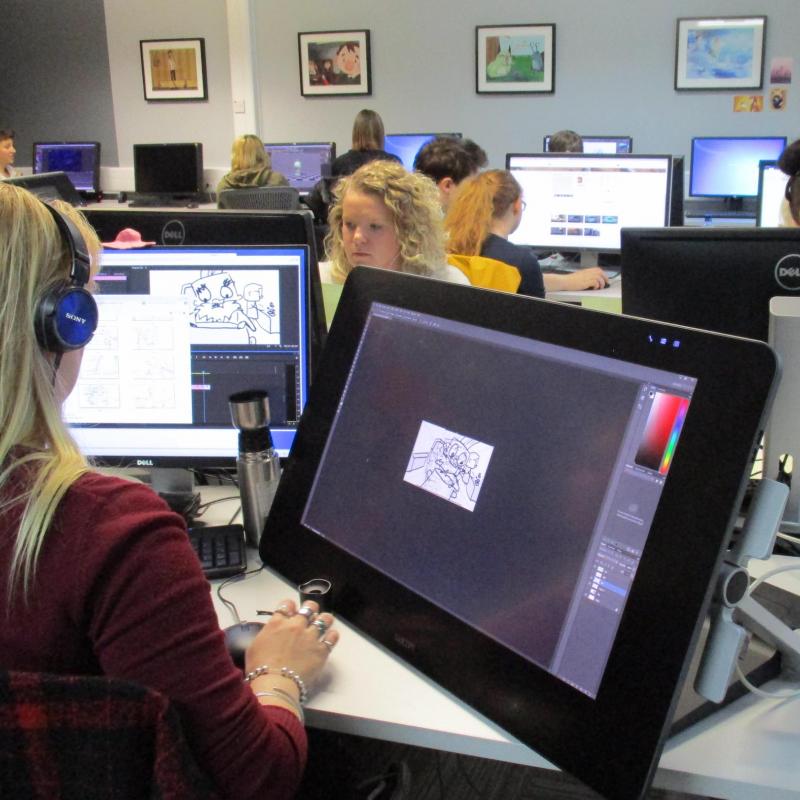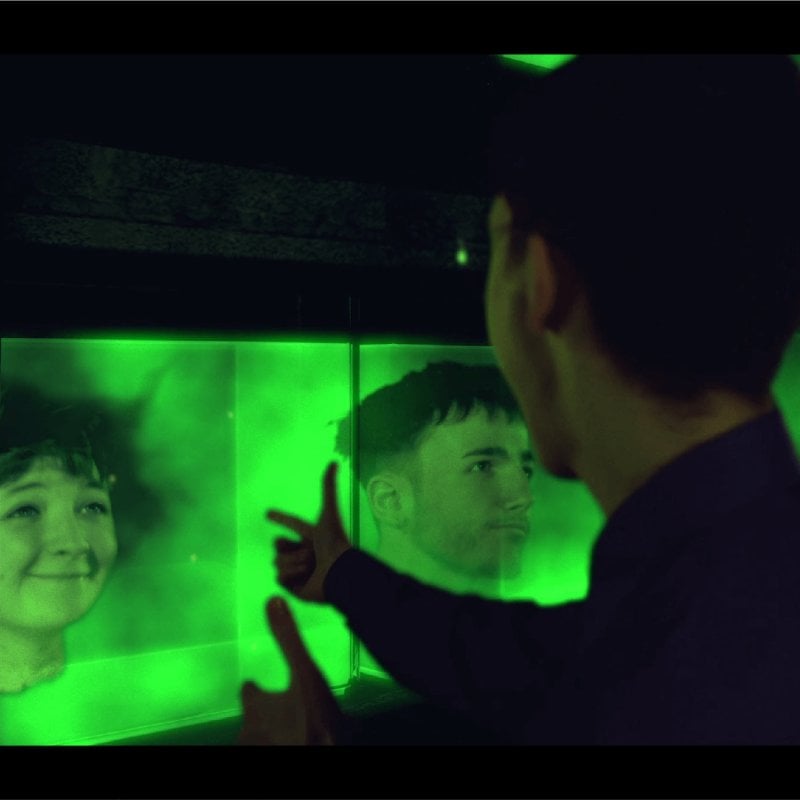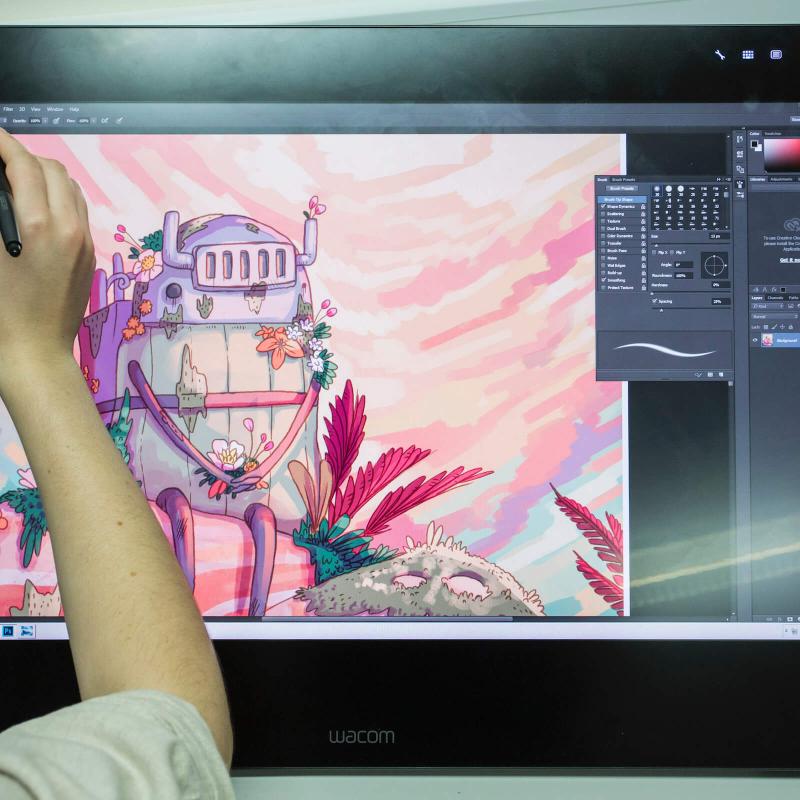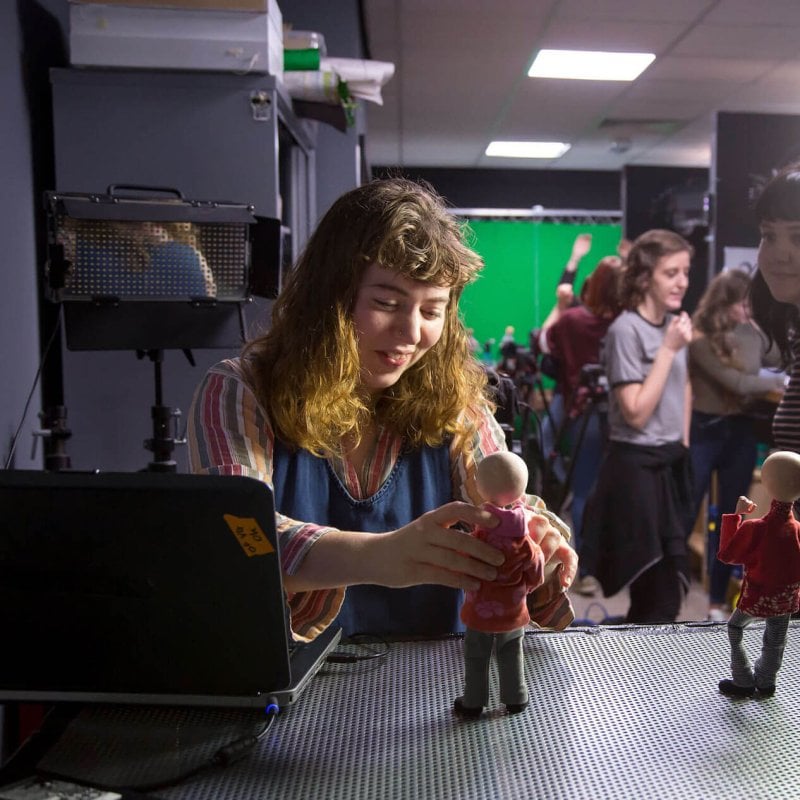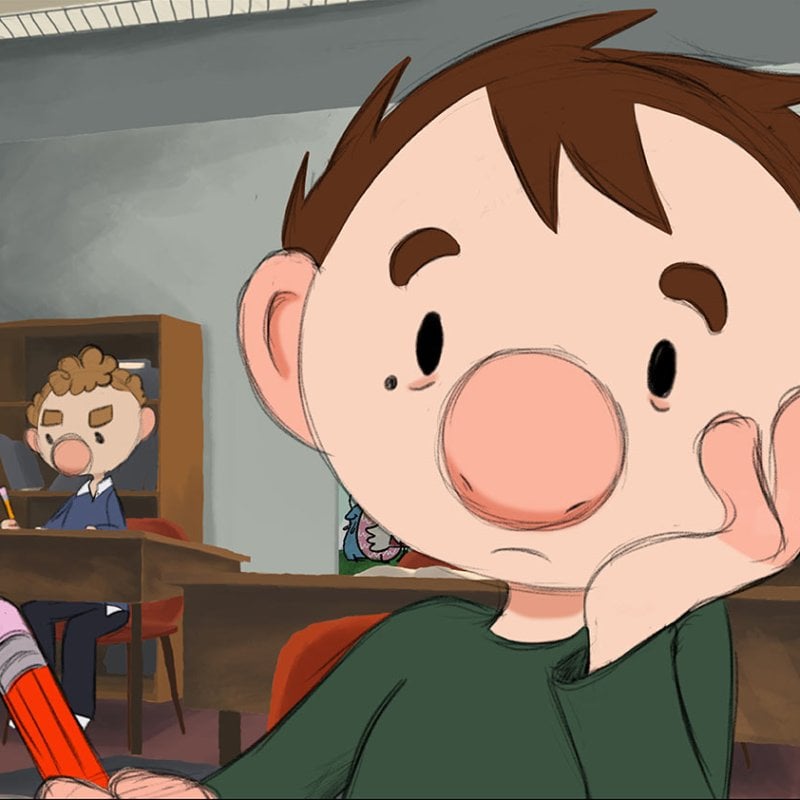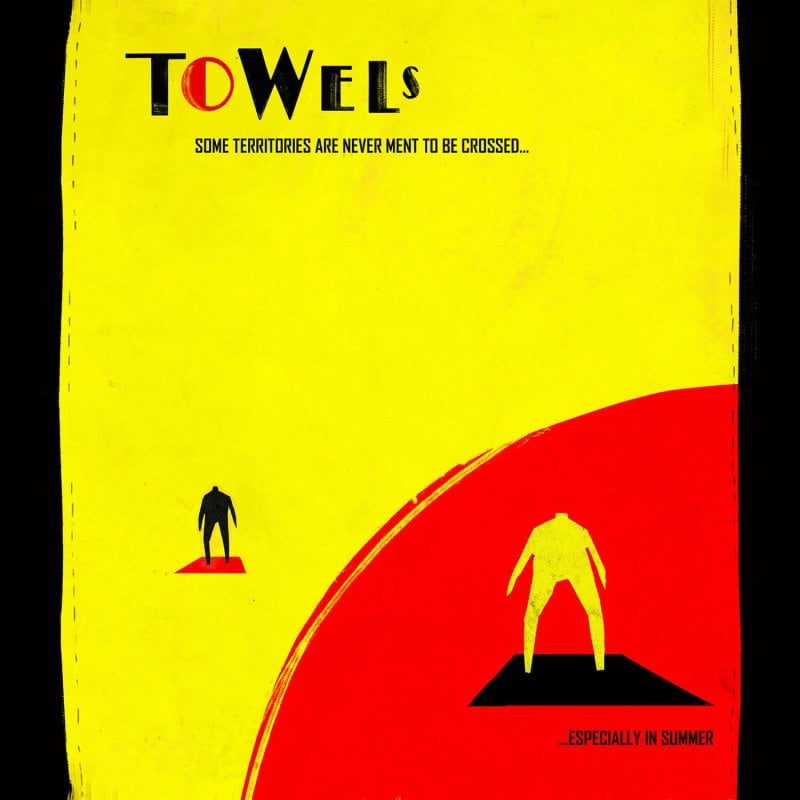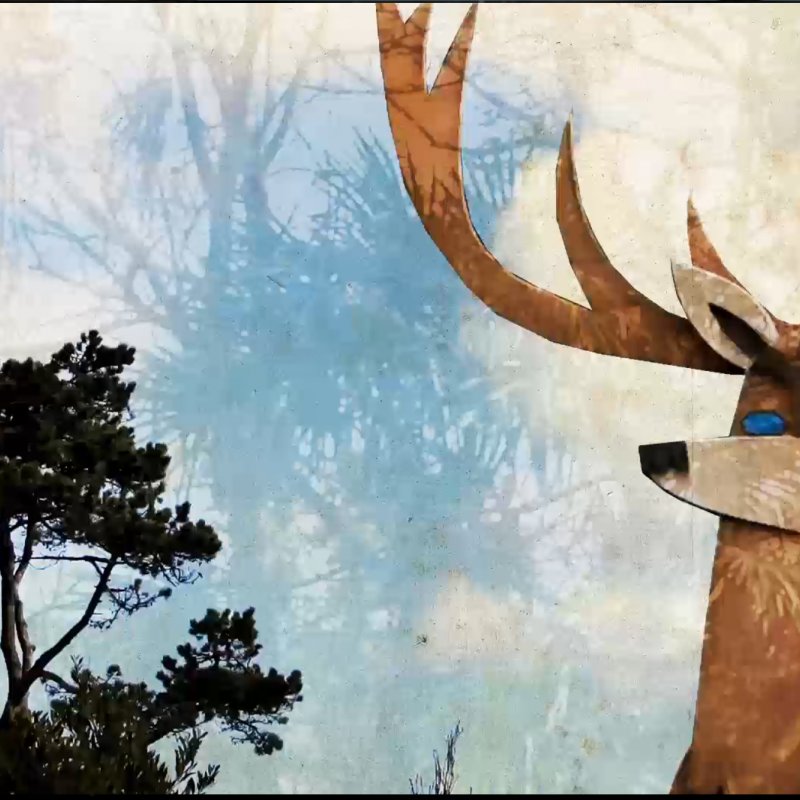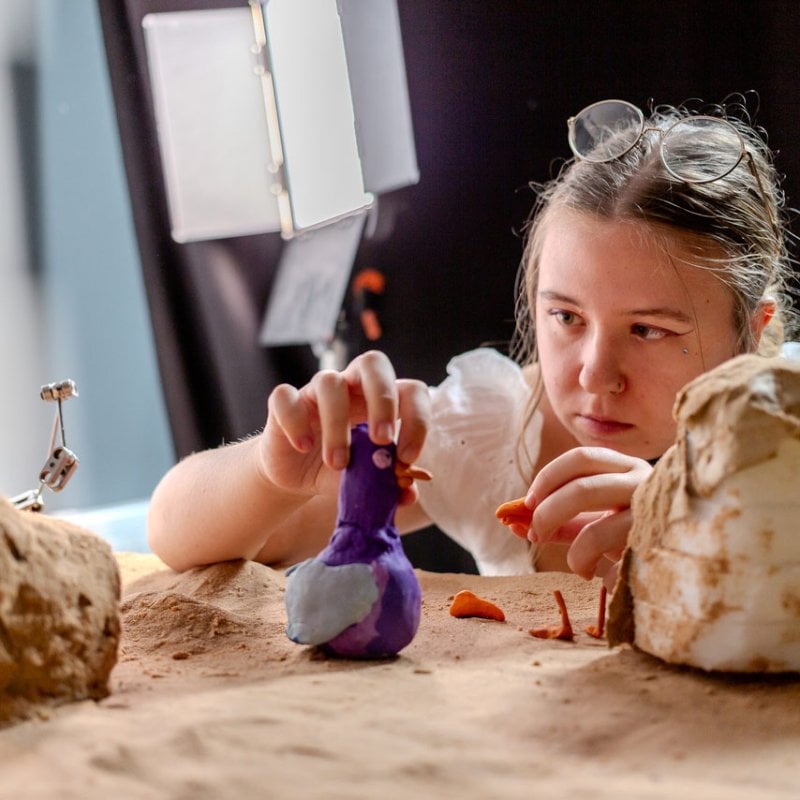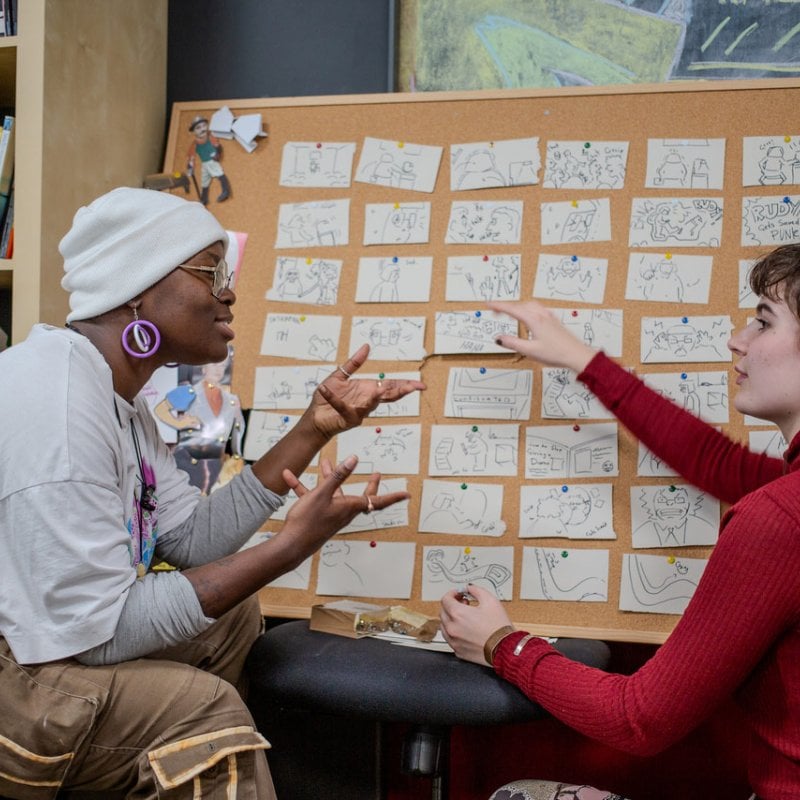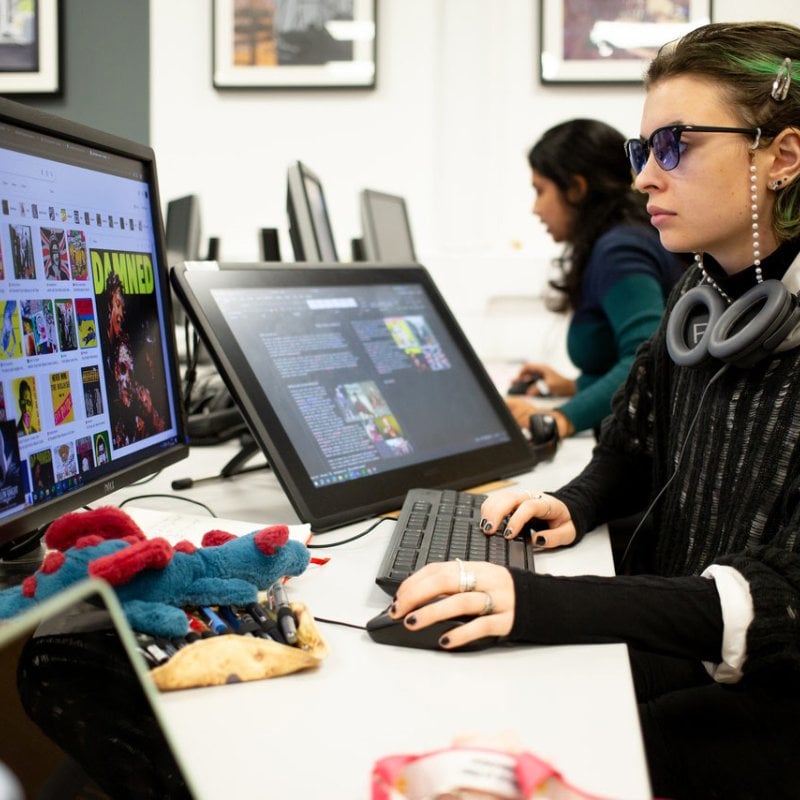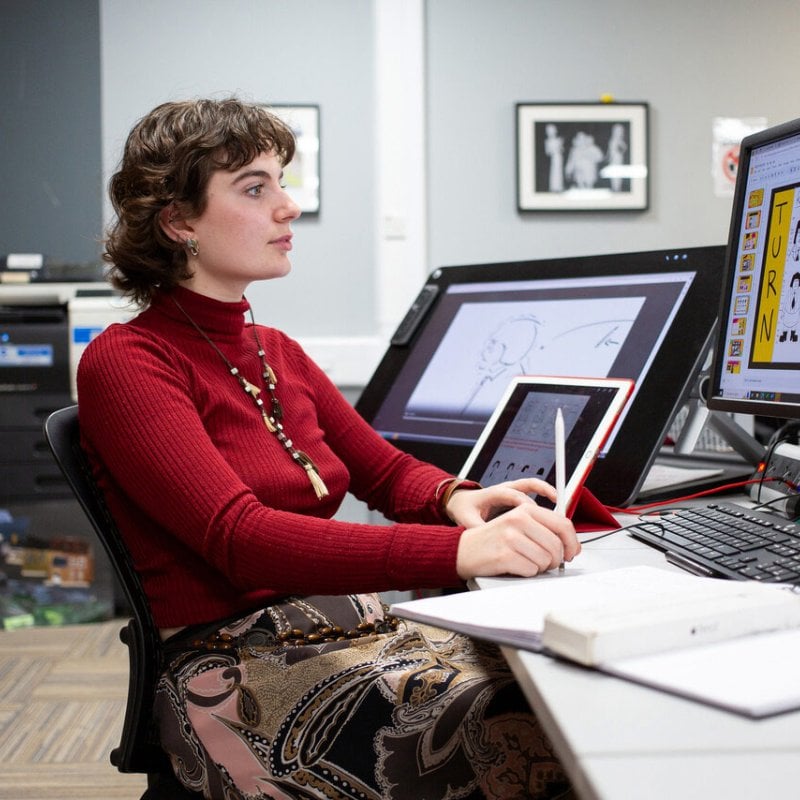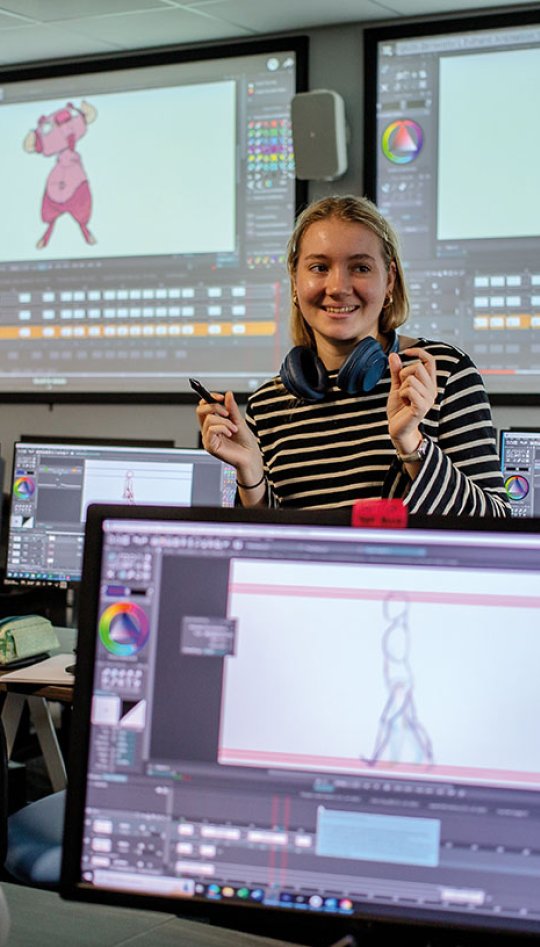
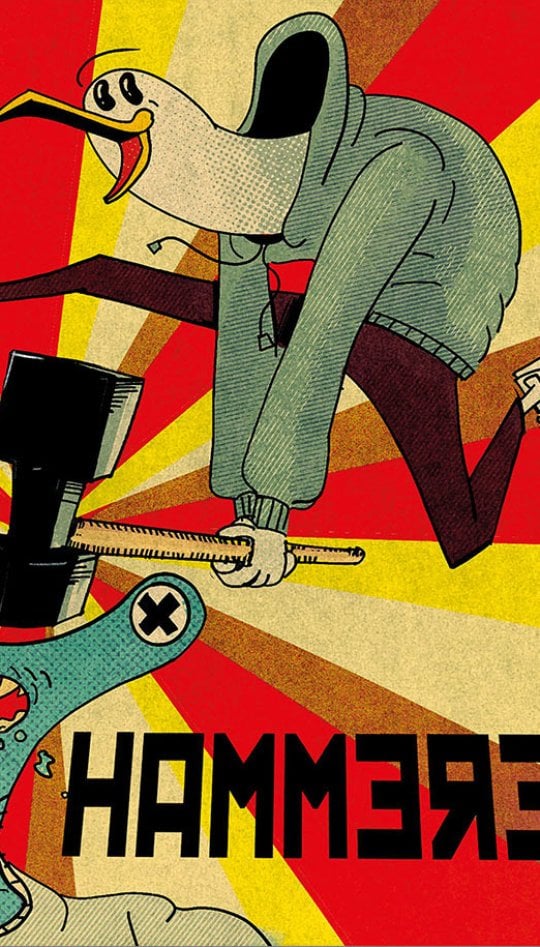
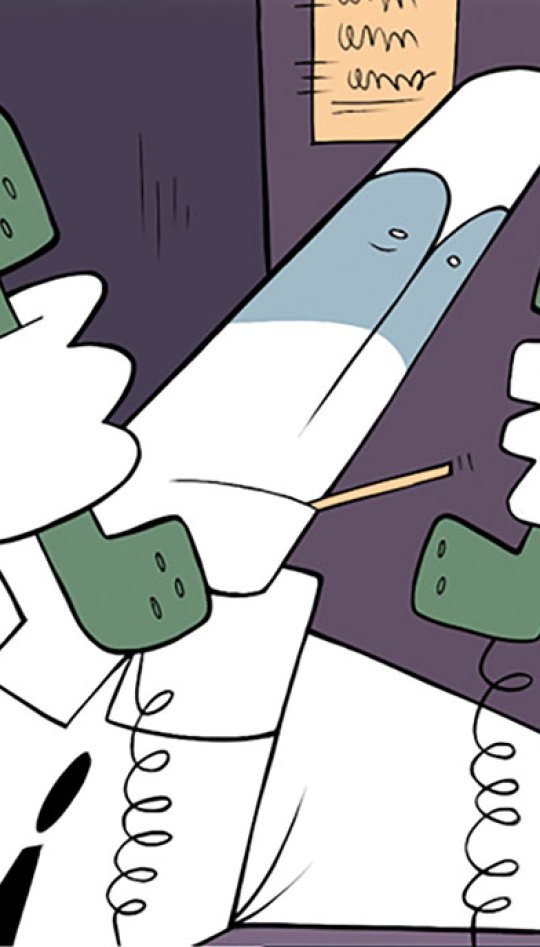
Animation BA(Hons)
Bring your ideas to life through the world of animation.
Course overview
Join this Animation degree and learn to craft believable worlds through animation, a dynamic medium for imaginative storytelling. This course blends traditional and life drawing techniques with 2D, 3D and stop-motion animation methods used in industry today. You’ll explore all aspects of animation before specialising and developing your personal style, preparing you for an exciting future in animation.
On this Animation degree, you’ll learn in an authentic studio set-up, using professional pipelines and working in the collaborative teams this industry thrives on. With the ability to pitch, present and produce, you’ll graduate as a capable, career-ready animator.
You will:
- Study at a university which is a member of CILECT, the association of the world’s best film, TV and animation schools
- Learn from staff with industry backgrounds and experience in film, children’s TV and advertising
- Work in multi-skilled teams, reflecting industry practice
- Develop technical and creative knowledge through character animation, storytelling, concept art and the use of software
- Hone your skills in the production of 2D, 3D and stop-motion animation, working in professional-standard facilities
- Underpin your creative work with theoretical and historical understanding
- Gain a working knowledge of industry practice
- Graduate with a varied and professional animation portfolio
Lead image by Lucy Gatenby and Rebecca Hardess.
Course details
On this Animation degree, you'll have the opportunity to gain a BA(Hons) degree over three years or the option to study Animation BA(Hons) with Integrated Foundation Year and/or professional placement.
Through this course, you'll develop your creative and technical skills, build professional practice approaches and hone your personal identity and autonomy within animation production. You'll master the art of your specialism in either 2D, 3D or stop motion animation and learn to present and pitch your ideas. Mirroring industry, you'll also work with multi-disciplinary teams to produce exciting, unique animation productions ready to make your mark in industry.
In the first year of your Animation degree, you'll explore 2D, 3D and stop-motion techniques to develop your understanding of the fundamental principles of animation. You'll build your knowledge of the animation pipeline and explore underpinning skills in drawing, design and techniques of film language, narrative structures and visual storytelling. You'll also learn to use industry-standard software to support all areas of your work.
Modules
Animation Practice 1
You'll begin by building essential foundation knowledge on the principles of animation with a focus on 2D and stop motion.
Animation Practice 2
A continuation of the previous module, here you'll deepen your understanding of the principles of animation, with the introduction of workflows in 3D animation.
Underpinning 1
You'll explore the practical and contextual ideas and concepts underpinning animation production.
Production Design
You'll be introduced to the creation of pre-production work for animation and how the pipeline is composed.
Design & Motion
In this module, you'll explore animation production through a range of design and technical responses.
Underpinning 2
You'll investigate key research concepts and critical debates in media, visual and cultural theory while developing concepts for animation production.
In your second year, the emphasis is on collaboration. Working on a live client brief as part of a team, you'll enhance your awareness of communication, time management, responsibility and job roles within the animation industry. You'll continue to develop your expertise in your chosen industry specialism, while refining your underpinning skills in drawing and techniques of film language, narrative structures and visual storytelling. You'll also develop critical research, identifying and exploring a topic that's related to your area of interest.
Modules
Planning
Working on a live client brief, you'll collaboratively plan, develop and create content materials for pre-production in animation for either 2D, 3D or stop motion.
Create
In this module, you'll develop fluency with roles and practices for animation production through a team-based assignment.
Underpinning 3
This module focuses on independently developing your specialist skills in 2D, 3D or stop motion, depending on your career aspirations.
Production
You'll extend and deepen an understanding of animation production and the roles within it.
Pre-production Collaboration
In this pre-production module, you'll work collaboratively, enabling and developing your communication and varied creative thinking skills.
Critical Proposal
In preparation for your final year Critical Research module, you'll propose an individual research project designed to give you the opportunity to enhance your understanding of a particular context of animation.
You can choose to take an optional professional placement after your second year on a three-year programme, or after your third year if you’re studying for a degree with an Integrated Foundation Year.
You’ll be responsible for finding your own placement, with support from the employability team.
Choosing this option will enhance your industry experience and skills while studying.
How you’ll study during your professional placement
You’ll spend time working in a professional context, as part of a business or organisation. This can be in one role, or up to three, and must be for a minimum of 24 weeks.
You’ll develop in-demand workplace skills, deepen your insight into industry and grow your network of contacts, all of which could help you get ahead in your career after graduation.
Throughout this year, you’ll develop a portfolio of work that includes critical self-reflection on what has been learned from the experience. You’ll be required to evidence your experiences, the skills you’ve learned and your professional growth.
Your third year of Animation BA(Hons) is focused around the final major project. You'll have the opportunity to present your film idea and take part in a pitching process, with industry professionals selecting films to go into full production.
You'll have complete creative control over the theme, concept and style of the project. Through the production process, you'll showcase your professional skills as you prepare to step into industry.
Modules
Critical Research
In your Critical Research module, you'll Independently research and develop a response to a self-selected topic.
Ideas and Development
In this module, you'll get the opportunity to pitch your film and your skills to a panel of industry professionals.
Major Pre-production
Throughout this module, you'll implement and achieve high level pre-production skills as you work within a team on successfully pitched films.
Production
Working on a collaboartive challenge, you'll demonstrate your technical animation production skills and professional practice know-how.
Profile
You'll build a portfolio of work that showcases your skills and sets the course for your career.
Why study an Integrated Foundation Year route?
If you’re taking on a new subject that you haven’t studied in depth before, have been out of education for a while or have a non-standard educational background then an Integrated Foundation Year degree may be the right choice for you. It is a four-year degree with an Integrated Foundation Year to start, which allows you to explore the primary elements of your subject before progressing on to the remaining three years of the BA(Hons) degree.
What you'll study in your Foundation year
If you choose this pathway, you'll study five core modules in your Foundation year. These are all designed to help you explore the foundational elements of your subject. You'll gain relevant technical skills, learn to experiment and take risks, develop an understanding of professional practice, have opportunities to work across disciplines and collaborate with other students on live project briefs.
Modules
Explore
You'll begin your foundation year by working collaboratively with others to explore themes of the future. You'll take risks, experiment through play and be supported to break through barriers.
Technique
You'll take subject-specific workshops and develop essential technical and practical skills in your area of study. You'll also enhance your analytical and organisational abilities.
Apply
You'll work with your peer group to think beyond discipline by addressing a societal or global issue. You'll then showcase your work to your peers and deliver and accompanying evaluation of your process.
Industry
You'll enhance your creative and practical skills in your subject specialism by responding to typical industry briefs, underpinned by focused research and experiments. You'll also gain industry insights through guest lectures and workshops.
Launch
You'll develop your unique identity in your specialism through the production of a self-initiated body of work. Your final project will be the bridge to your next year, fully supported by evaluative reviews and critical analysis of the work you have created.
After the Foundation year, you progress into Year One of the full three-year degree, equipped with a deeper knowledge of your subject, a clear understanding of your strengths, and develop a practical and technical skillset and the confidence to excel in your chosen subject.
If you apply for and enrol onto a degree with an Integrated Foundation Year, you’ll have the option to switch onto a five-year version including a placement year. That means you’ll complete the first three years of your course before completing a placement in industry in your fourth year and returning to Falmouth for the fifth year of your programme.
As part of our process of continuous improvement, we routinely review course content to ensure that all our students benefit from a high-quality and rewarding academic experience. As such, there may be some changes made to your course which are not immediately reflected in the content displayed on our website. Any students affected will be informed of any changes made directly.
From module information to course aims and assessment criteria, discover the full course details:
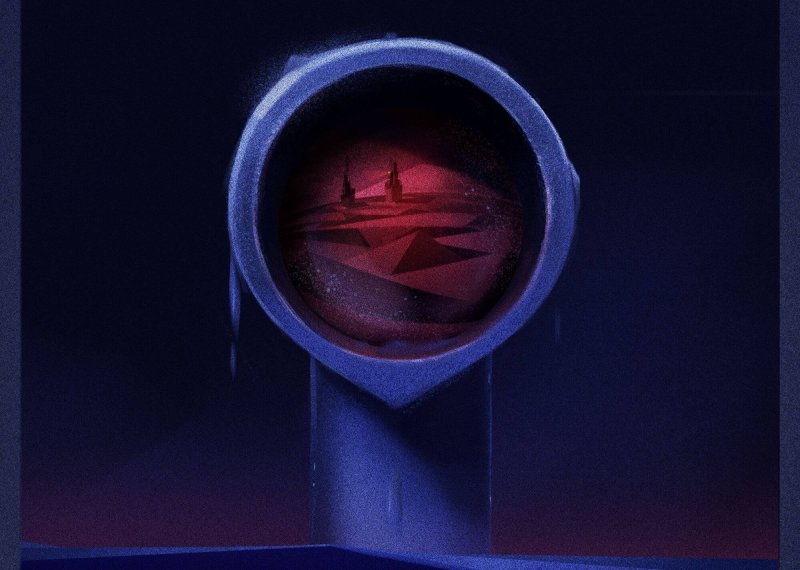
Short animation 'Middle Watch' by animation staff, students, alumni and industry professionals, shortlisted for a BAFTA.

"I love learning new ways of enhancing my ideas with my talented peers and my lecturers, many of whom still work in the industry."
Amrutha Nair, current student
A CILECT School of Film and Television
We're part of the International Association of Film and Television Schools. This means you'll be part of a global network of interconnected film schools able to tap into equipment and expertise around the world.
In 2016 The School of Film & Television was invited to join CILECT. Founded in Cannes in 1954, CILECT consists of the best film schools from around the world. CILECT institutions are found in 65 countries on six continents.

Stories from our community
Explore student projects, graduate successes, staff news and industry insights.
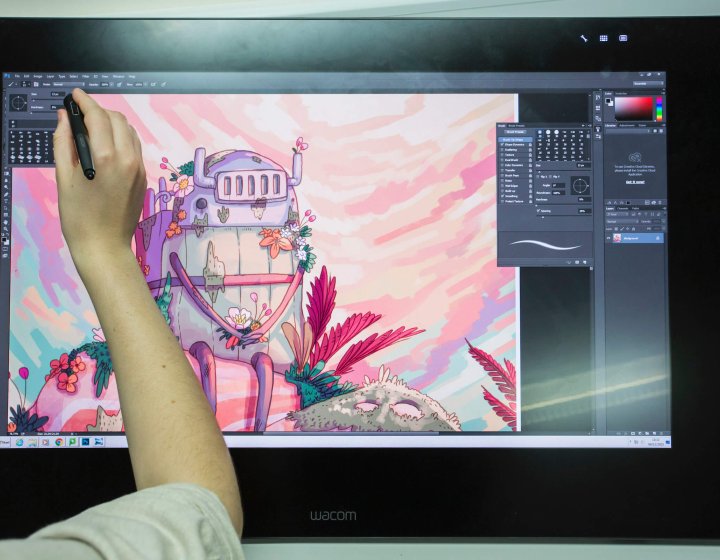
Why I chose to study Animation at Falmouth
08 May 2024
Choosing which course to study can be a daunting decision. You might find yourself drawn to the worl...
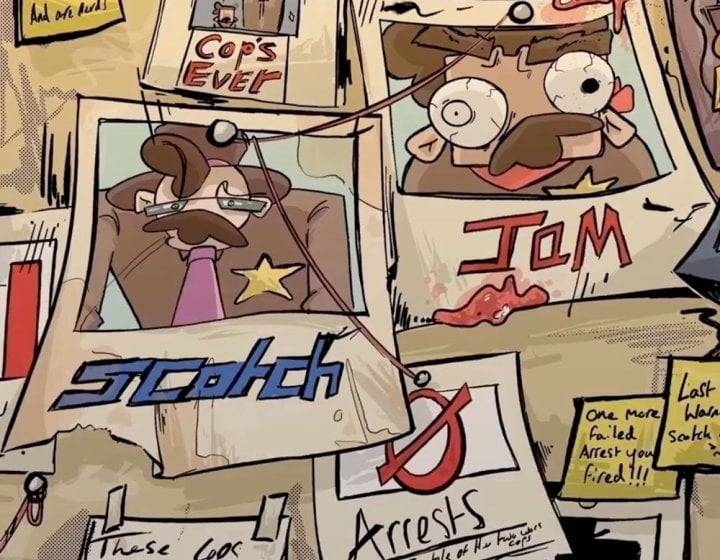
Animation students scoop RTS award
15 April 2025
When second-year Animation BA(Hons) students Faith Evans and Dylan Pierce first came up with the ide...
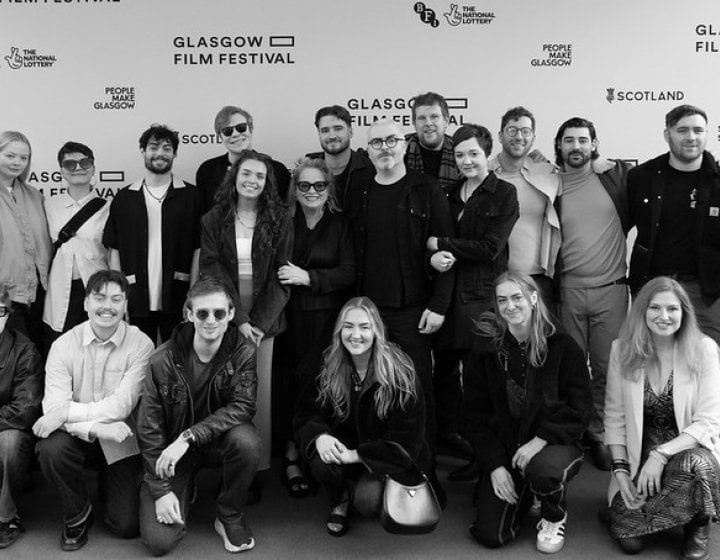
‘The Birdwatcher’ premieres at UK’s leading horror film festival
21 March 2025
Students from across Falmouth’s School of Film & Television, Fashion & Textiles Institute, and Gam...
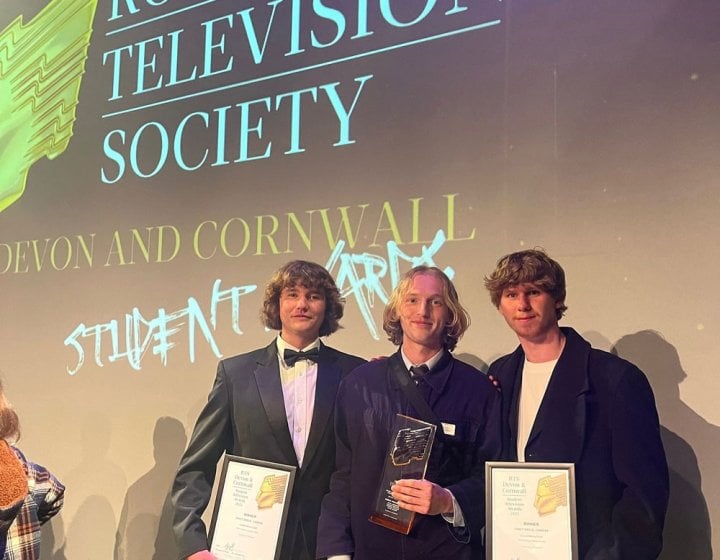
Graduate's seaweed plastic documentary wins more recognition at Royal Television Society Awards
21 March 2025
Television & Film Production BA(Hons) graduate Olaf Lawrence’s documentary about seaweed plastics ...
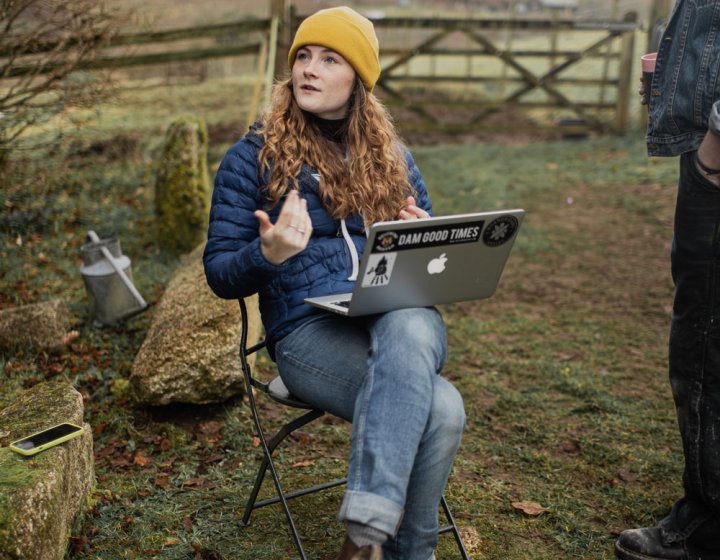
Film graduate Rachel Clear Burton on working as a production coordinator
03 March 2025
Rachel Clear Burton has enjoyed a series of exciting achievements, including the success of her fina...
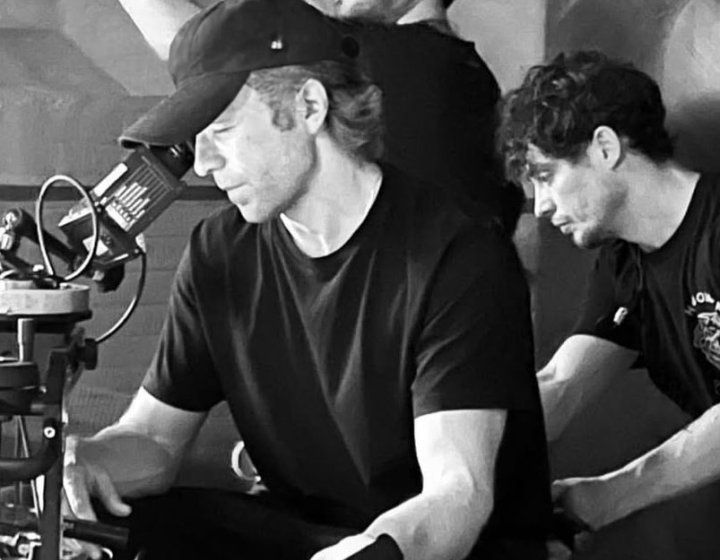
Graduate cinematographer Bryan Gavigan on his BAFTA Cymru win
13 January 2025
Film graduate Bryan Gavigan scooped a BAFTA Cymru award for his work on the crime drama Passenger. B...
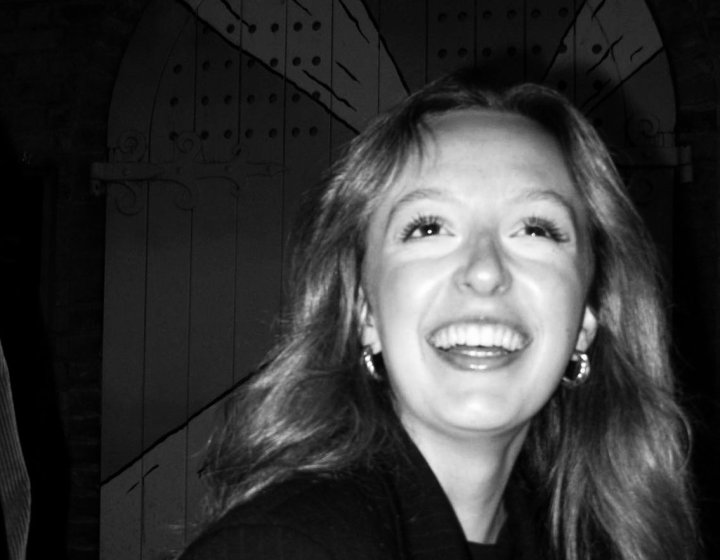
Film graduate brings Grenfell stories to life
20 December 2024
Film BA(Hons) graduate Lydia Knights has produced a compelling documentary film for the community fo...
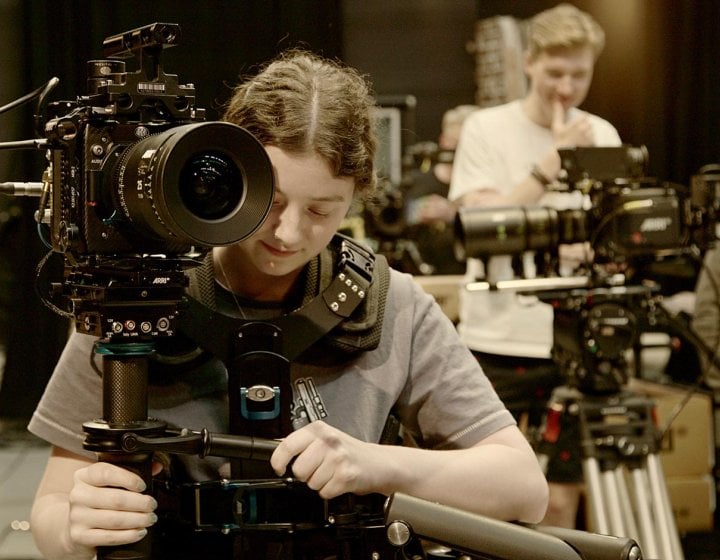
From script to screen: How to develop your film idea
25 November 2024
Get an insight into how the film production process works - from developing your initial idea to cra...

Work by Nathan Bedford
A guide to Worldbuilding
31 October 2024
Worldbuilding shapes the sights, sounds, and experiences that draw audiences into a new universe. Bu...

DEATH x DESIGN x CULTURE: Falmouth hosts conference exploring design’s role in death
30 October 2024
2024 welcomed the inaugural DEATHxDESIGNxCULTURE conference to Falmouth.
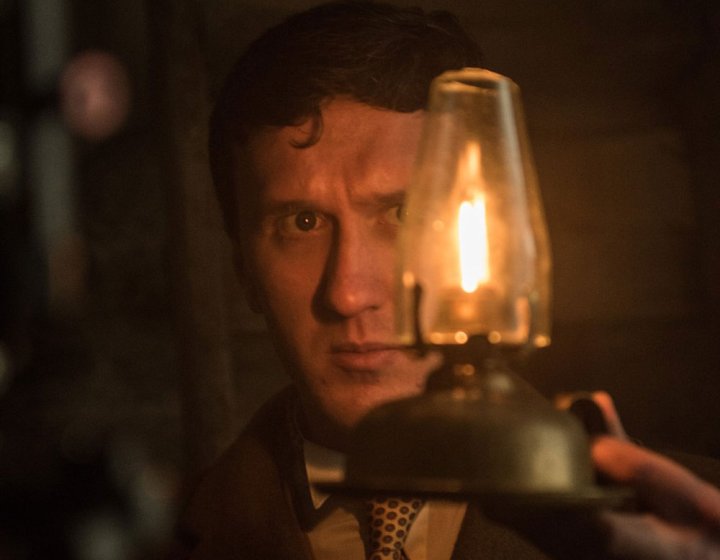
Dr Kingsley Marshall’s top horror films of the year, and of all time
29 October 2024
The Head of the School of Film & Television talks through his top horror picks for your viewing plea...
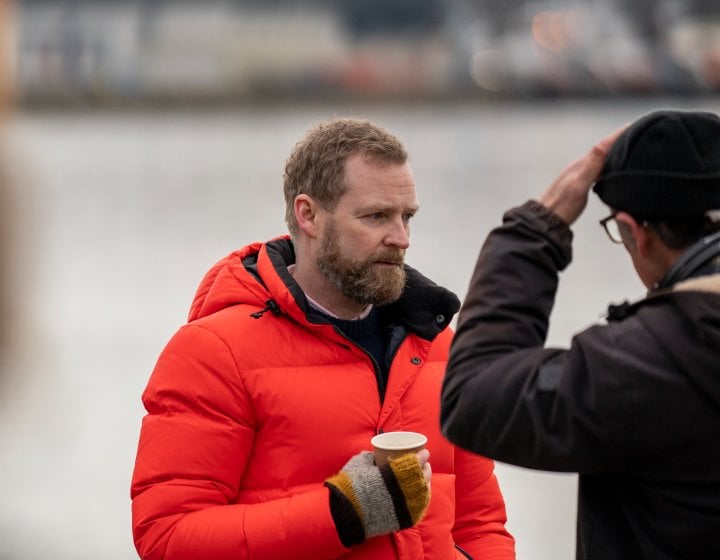
Dr Kingsley Marshall on what makes a good horror movie
22 October 2024
I’ve always been drawn to horror; the 1970s ‘Giallo’ movies from the Italian director Dario Ar...

Why Mums Don't Jump: the student animated film breaking health taboos
18 October 2024
The animated short film Why Mums Don’t Jump (2023) made by students at Falmouth University h...

Where Memory Flows: BA Film’s Dr Struan Gray Conducts Research on Rivers as Spaces of Memory in Chile
03 October 2024
Dr Struan Gray, Senior Lecturer on BA Film, has recently returned from a research trip to Chile and ...

The Severed Sun set for world premiere at Fantastic Fest
19 September 2024
The Severed Sun, the debut feature film from director and Falmouth University lecturer, Dean Puckett...

A new life awaits: my personal journey to AI | Dr Kingsley Marshall
18 September 2024
For so much of my life artificial intelligence has only ever been a feature of science fiction: ofte...

More Rookies recognition for animation alumni
30 August 2024
Graduate Gihan Fernando has received some of the highest accolades at the Rookie Awards 2024.
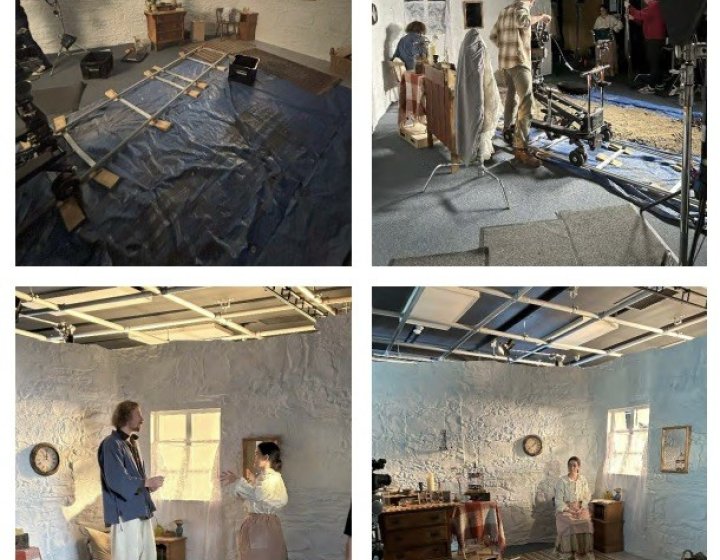
Film & TV master’s students on their placement at Verve Media
09 August 2024
Four students on the Film & Television MA course completed a week’s placement at Verve Media earli...
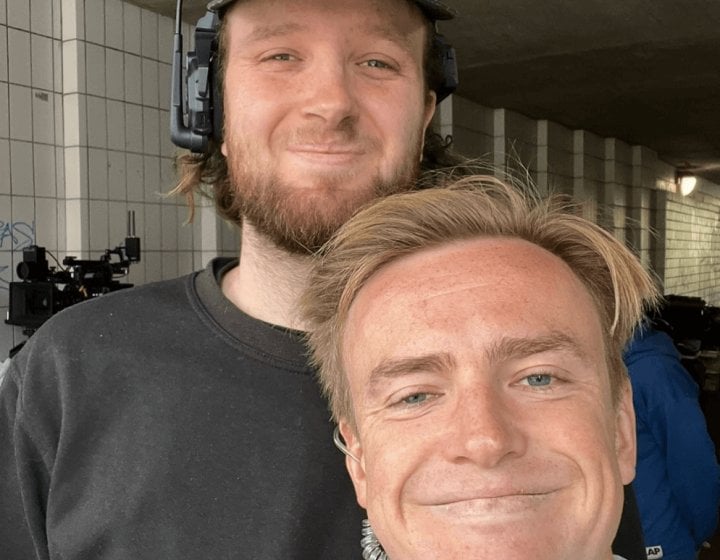
Falmouth grads meet on set of Netflix’s The Devil’s Star
22 July 2024
Two Film BA graduates - who didn’t know each other during their studies - have started working tog...
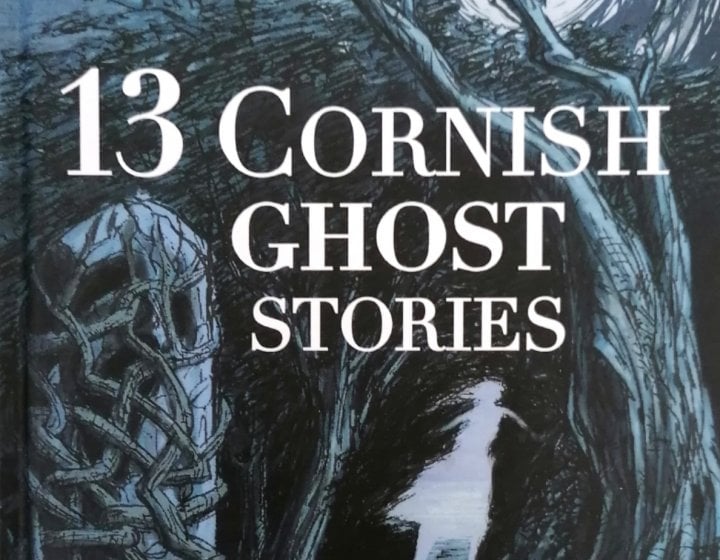
'13 Cornish Ghost Stories': new anthology published by three senior lecturers
05 July 2024
'13 Cornish Ghost Stories', a chilling anthology of new Cornish ghost stories hit the shelves on 20 ...
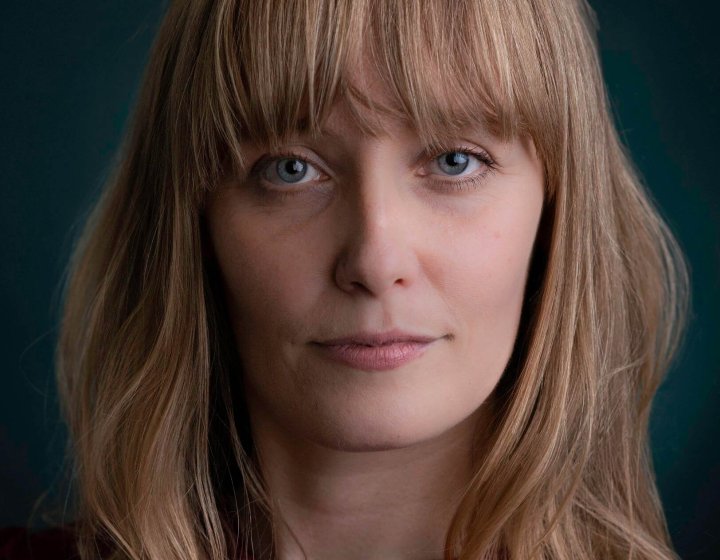
Image credit: Duncan Guymer
Susan Lay’s journey from MA to filmmaking in Cornwall
04 July 2024
Susan Lay studied MA Film & Television, graduating in 2019, and has since gone on to write, produce,...
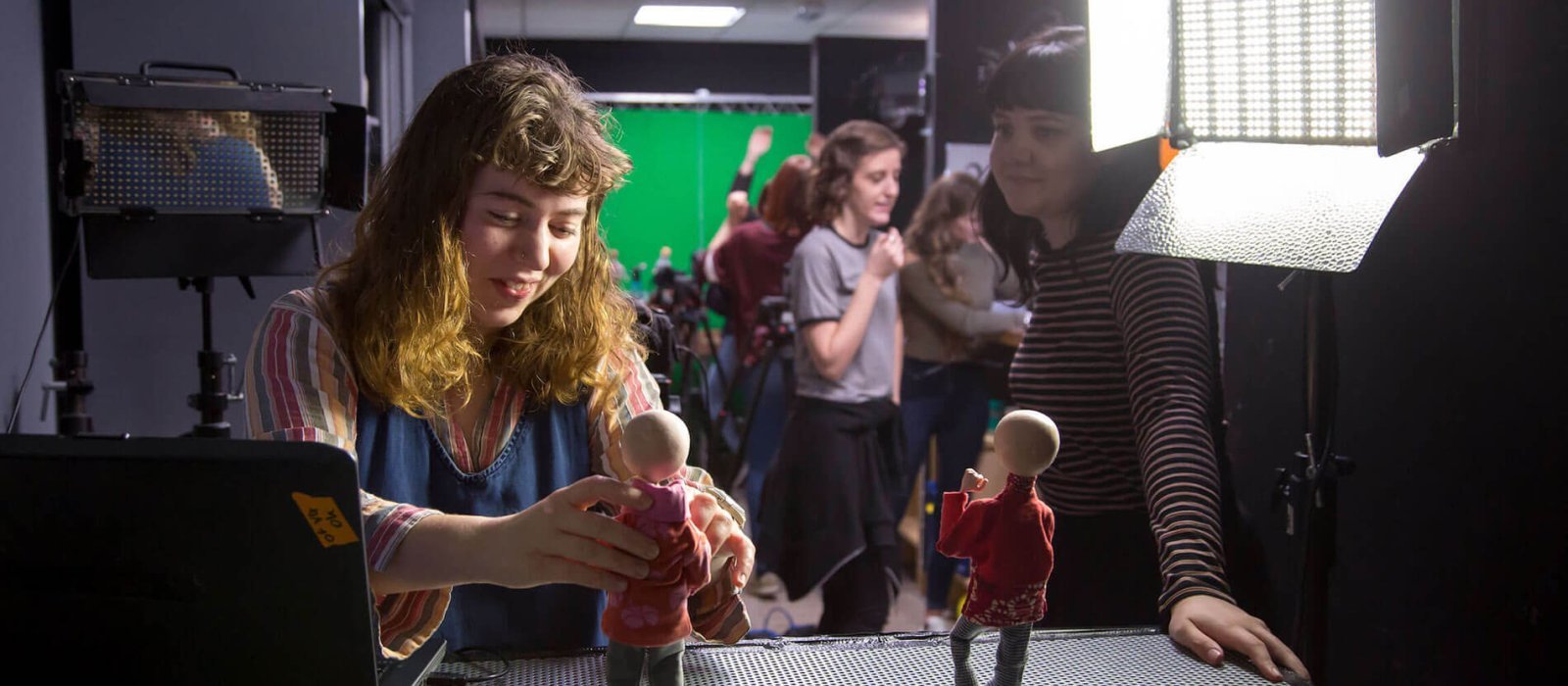
How you'll learn & be assessed
On this practice-based Animation degree we combine theory, creative experimentation and technical tuition to meet the demands of the animation industry. By starting as an individual and quickly migrating to working in creative teams, you'll mirror life as an industry professional. You'll also develop your own industry specialism, be that as a director, producer, animator, rigger, texture, layout or background artist.
On top of lectures, seminars, workshops and tutorials, you'll take on live briefs from industry clients, attend guest lectures and work with an industry mentor in your third year.
At Falmouth, we use a 'digitally enhanced learning & teaching' approach. Your experience will always be predominantly in-person, including seminars, tutorials and studio teaching, with some, more targeted elements, being online either live (synchronous) or pre-recorded (asynchronous). You can read more here.
We employ a variety of assessment strategies over the course of this Animation degree. These include the submission of portfolios of practical work, presentations, essays, written or verbal reports and a major research project. In your first year, you'll also have the chance to take part the process of peer group assessment.
Your summative (final) assessments occur at the end of each module, usually at the end of the study block. However, you may have interim formative assessments part way through a module as well. These assessments help ensure that you remain on track with your work.
You'll receive continuous feedback on all your work throughout the year. This will be delivered through tutorials and while you are working in the studio. At the end of a module, you'll receive detailed written feedback and will have the chance to discuss this with your assessor.
If you choose the Integrated Foundation Year pathway for this course, all assessments within your foundation year will be 100% coursework based.
This course could be for you if...
- You like to communicate in through different media
- You enjoy the process of creating and the final outcome
- You want to learn more about different mediums and their cultural and historical contexts
- You're self-motivated and resilient
- You enjoy working with others
- You want to have the opportunity to grow your skills and explore your creativity
Facilities
The multi-million-pound, industry standard School of Film & Television offers professional facilities including:
- Three animation software studios, containing powerful Dell Precision Workstations with Cintiq 24" & 27" pen displays. Industry aligned software available includes Autodesk Maya (3D), TV Paint & Toon Boom (2D), and Adobe Creative Cloud Suite eg. Premiere, Photoshop
- Two dedicated stop-motion animation studios, equipped with stages, Canon EOS camera bodies, Nikon lenses, Dedolight and Rosco lighting fixtures, Manfrotto grip and Dragonframe image capture software.
- Access to life drawing studio
- Nine Mac Pro edit suites with Avid Media Composer, Adobe Creative Cloud Suite & Da Vinci Resolve.
- Four large production studios:
Production Studio 1: multipurpose studio equipped with three Sony HXC-FB80 studio cameras, chromatte grey screen and full lighting rig. Integral live gallery includes 4-input Tricaster Ultra HD production system.
Production Studio 2: multipurpose studio and support area for studio 1.
Production Studio 3: multipurpose studio with lighting rig.
Production Studio 5: Specialist green screen studio with infinity cove & 360 degree subject lighting rig. Access to Xsens motion capture kit and VR/AR/MR equipment.
- 129-seat cinema, with Christie M Series 2.5k projection and 7.2 surround sound.
- Two 28 seat ‘Post Hubs’ for post-production software training - equipped with dual screen Apple iMacs. Software available includes Avid Media Composer, Adobe Creative Cloud, Da Vinci resolve and Pro Tools. Production management software is also available.
- 25-seat dubbing theatre with Avid S6 mixing desk and Pro Tools Ultimate.
- Three further post-production audio suites – all equipped with Pro Tools Ultimate.
- Foley/ADR suite with access to wide range of mics, foley traps and props.
- All post-production suites network-linked to Avid NEXIS shared storage system for seamless access and integration of projects.
- Digital cameras (HD to 4K) including Arri Alexa, RED, Sony, Canon, Blackmagic, Panasonic alongside Arri SR3 and Bolex 16mm film cameras. Odyssey 7Q+ External Recorders are also available.
- Wide range of hot and cold (LED) lighting equipment including systems by Arri, Dedo & Kino Flo alongside traditional blondes and red heads.
- Grip and gimbal systems available include Free-Fly Movi M5, Wally Dolly, Indie Dolly, PD1 Dolly, Koolertron Sliders, Glidecam 2000, Libec and Camcrane Jibs.
- Audio equipment includes Sound Devices 633 mixers, recorders and an extensive range of microphones.
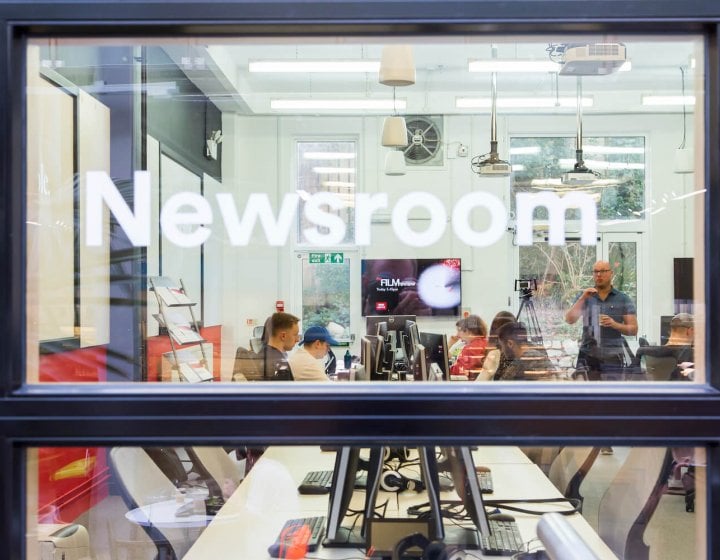
Media Equipment and Facilities
Our industry-level facilities offer everything you need to practice and produce animation, film, TV,...
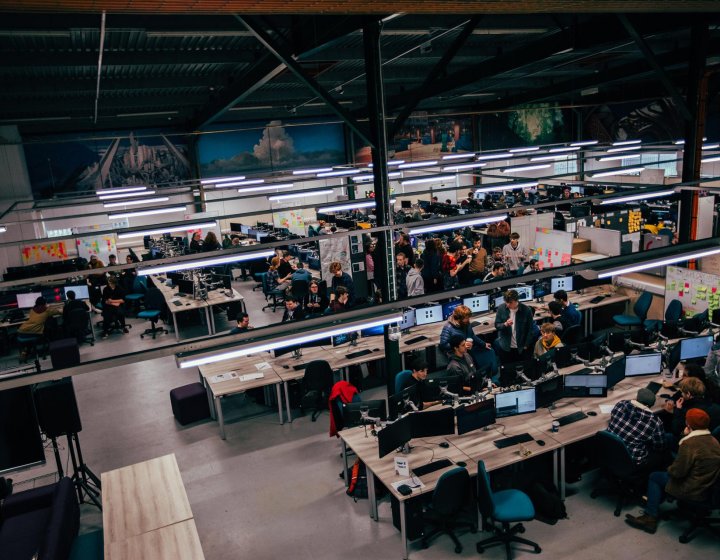
Games Academy Facilities
Our Games Academy offers professional-standard studios, a dedicated craft room, breakout spaces, and...
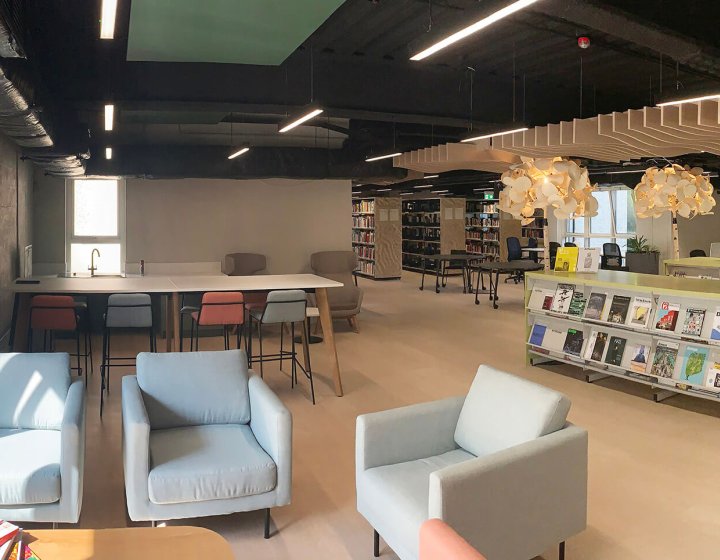
Library Facilities
Offering extensive collections, our two libraries provide a wealth of digital resources, magazines, ...

Sports Centre
Our Sports Centre, on Penryn Campus, includes a spacious gym with up to 90 of the latest, new statio...
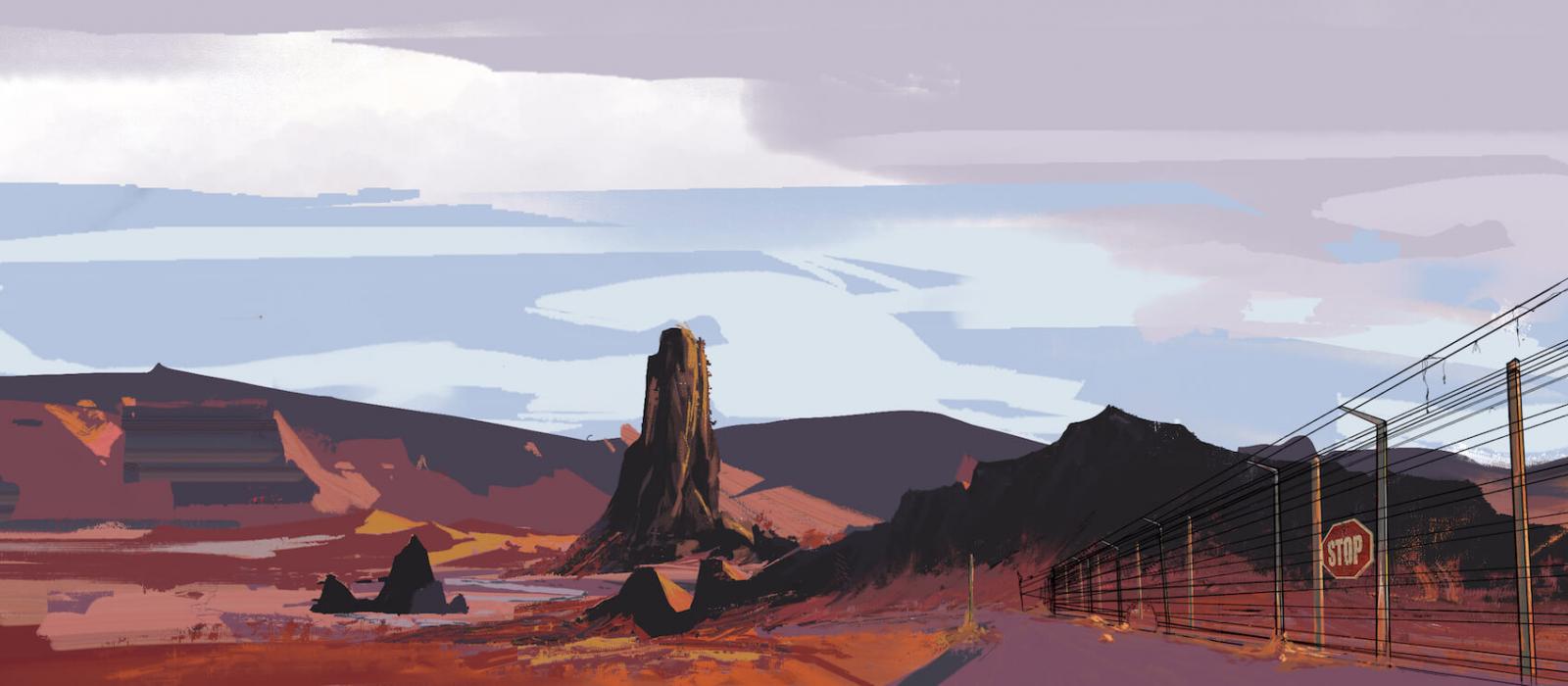
Staff
Our staff members are award winning experts with multiple awards to their name. From working in 2D, 3D & stop motion in directing, production, design, layout and animation, the academic team have extensive industry-wide experience.
We pride ourselves on our industry partnerships which reach beyond the UK to some the best animation studios around the world. This provides essential networking opportunities for our students and alumni and helps inform and shape our curriculum.

Nicola Marlborough
Course Leader, Animation BA(Hons)
Nicola is an experienced animator, practitioner of the world of animation.Nicola joined Falmouth in ...

Derek Hayes
Senior Lecturer
Derek Hayes is an award-winning director, specialising in animation, with sidelines in live-action a...

Rosa Mulraney
Senior Lecturer
Rosa Mulraney is a Senior Lecturer on the BA (Hons) Animation course within the School of Film and T...

Peter Felstead
Senior Technician
I joined the University in 1991 when I moved to Cornwall. My first role was to run the photography s...

Dr Jem Mackay
Course Leader, Film & Television MA (Online)
Dr Jem Mackay is a filmmaker/artist who has been exploring collaborative systems within creative pro...

Julian Wright
Lecturer, Post-Production and VFX
From a young age Julian has had a fascination with the creation of imagery, be it stills, sculpture,...
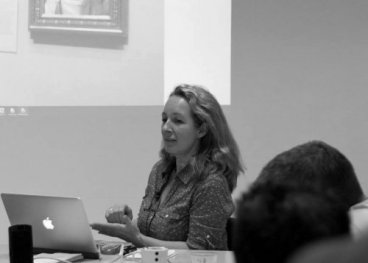
Katharine Nicholls
Senior Lecturer
With over a decade in the Animation industry in addition to her work as a freelance illustrator, art...
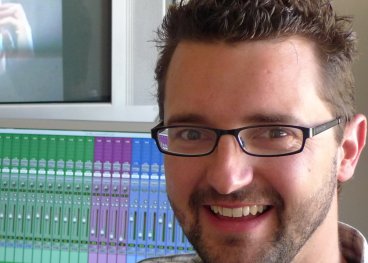
David Smithers
Co-opted Professional Services Staff Member
After graduating with a degree in History and Media from the University of Leeds, David started his ...

Michael Faherty
Lecturer
I have worked professionally for more than 20 years in animation, CG and visual effects. My int...

Adam Blackmore
Lecturer, Game Art & Animation (Integrated Foundation Year)
I teach Game Art & Animation on the IFY Course here at Falmouth. Prior to this I have been invol...
Some members of staff only teach on specific modules, and your course might not feature every staff member who teaches on the course.

Got a question about this course? Ask our course team now.
Chat to usCareers
"Falmouth is one of the few universities we work with as part of the Envy Academy. Due to the quality of the curriculum and staff, they are regularly producing employable talent"
- Tom Morgan, Head of Client Services, Envy Post Production

What can I do with an animation degree?
An Animation degree can open up lots of opportunities for you. Whether you want to go into the film industry, or pursue careers in other media sectors such as gaming, publishing, marketing or sport.
Read more about careers in animation
Our Animation graduates have worked as:
- Riggers and Compositors at Blue Zoo and Cinesite
- Coordinator at Studio AKA and Industrial Light & Magic
- Model Maker at Laika Studios (Coraline, ParaNorman)
- Artists and Pre-vis Artists at DNEG
- Part of the Aardman Animations team (Wallace & Gromit, Chicken Run)
How to apply
Ready to apply for 2025?
You can apply for our undergraduate degrees via UCAS. You'll need our university UCAS code (F33) as well as your course code (which you'll find on your course page) for your application.
| Course route | UCAS code |
|---|---|
| Animation BA(Hons) three year degree | W615 |
| Animation BA(Hons) with Integrated Foundation Year | FY23 |
| Animation BA(Hons) with professional placement | PY53 |

Application advice & interview information
Go to ToolkitFor starting your studies in 2025
UK applications: 29 January 2025 (for equal consideration)
Applications after the 29 January will be considered on a first-come, first-served as long as there are places available. Apply for this course now.
International fee payers
International fee payers can apply throughout the year. But we recommend applying as early as possible, to make time for visa and travel arrangements.
We consider all applications on their own individual merit and potential. We invite all applicants to an interview day or audition to give them the opportunity to demonstrate this along with what inspires and motivates them in their field. Applicants will also be able to show their portfolio or give a performance depending on the course. We welcome applications from all subject backgrounds, whether you’ve specialised in STEM, the arts or humanities.
Course routes & entry requirements
BA/BSc(Hons) three year degree: 104 – 120 UCAS Tariff points
BA/BSc(Hons) four year degree with professional placement: 104 – 120 UCAS Tariff points
BA/BSc(Hons) four year degree with Integrated Foundation Year: 80 – 120 UCAS Tariff points
Check the title of your course to see if it's a BA or BSc award. UCAS Tariff points will primarily be from Level 3 qualifications such as but not limited to A-levels, T Levels, a BTEC/UAL Extended Diploma or a Foundation Diploma.
For applicants whose first language is English we require you to have or be working towards GCSE English Language Grade 4 (C), or equivalent.
If English is not your first language you will need to meet the same standard which is equivalent to the IELTS Academic 6.0 overall score, with at least 5.5 in Reading, Writing, Speaking and Listening. We accept a range of in country equivalencies and approved tests.
If you need a student visa to study in the UK, you may need to take a recognised language test. You can read our English Language Requirements for more information.
Fees, costs & funding
Tuition fees
| Annual tuition fee | Student |
|---|---|
| £9,535 per year | Full-time UK |
| £17,950 per year | Full-time EU/international |
| £1,905 per professional placement year | Full-time UK and EU/international |
| £9,535 per Integrated Foundation Year | Full-time UK |
| £17,950 per Integrated Foundation Year | Full-time EU/international |
| Annual tuition fee | Student |
|---|---|
| £9,250 per year | Full-time UK |
| £17,950 per year | Full-time EU/international |
| £1,850 per professional placement year | Full-time UK and EU/international |
| £9,250 per Integrated Foundation Year | Full-time UK |
| £17,950 per Integrated Foundation Year | Full-time EU/international |
Tuition fees for September 2026 will be confirmed in summer 2025.
Typical course costs
- £70 - Recurring annual costs (materials, drawing supplies, USB storage, etc.)
- Laptop or desktop computer capable of running 3D/2D animation software – typical cost approx. £1,500. Please note, you will also have access to specialist computers in our Animation and Production Studios throughout the course – see more info under the Facilities section, above.
- £450 - Optional study visits and placements for the course duration
If you need to bring equipment or materials with you, these will be outlined in your Welcome Letter.
Additional typical course costs for Integrated Foundation Year pathway
- £250 for materials
- A laptop/desktop computer
- Adobe Creative Suite
To engage in the digital learning activity, although you will be able to access IT suites on campus, you will benefit from a laptop to access the platforms and tools we use. Depending on your subject, you may need a specific type of computer. If you're unsure about what you might need, please contact our course advisors.
Tuition fees are set annually and are subject to review each year. The University may therefore raise tuition fees in the second or subsequent years of a course, in line with inflation and/or the maximum permitted by law or Government policy. Students will be notified of any changes as soon as possible.
The figures above don't include accommodation and living costs
Funding
For information about funding available, please visit our student funding pages.
Ask a student
What better way to find out about life at Falmouth University than by asking our current students?
From course details and academic support, to the social scene and settling in, our students are ready and available to answer any questions you might have. Simply set up your account, send them a question and they'll get back to you within 24 hours.
Similar courses
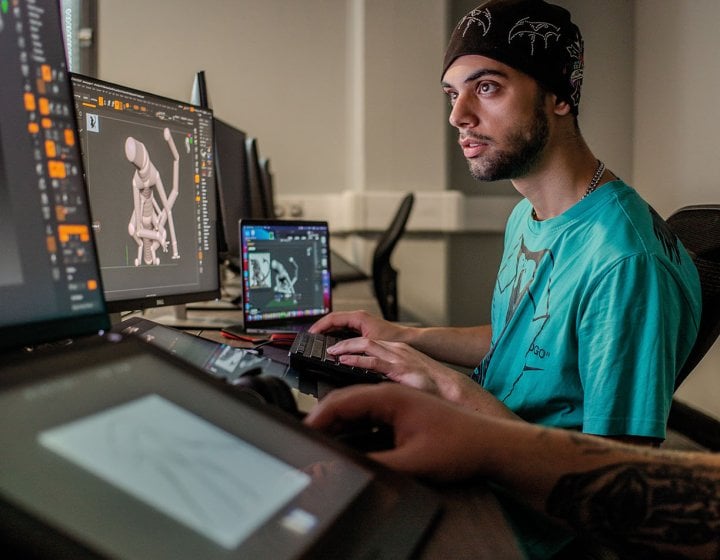
Post Production & Visual Effects BA(Hons)
Take your first steps in building a career on this industry-focused course, which covers all aspects...
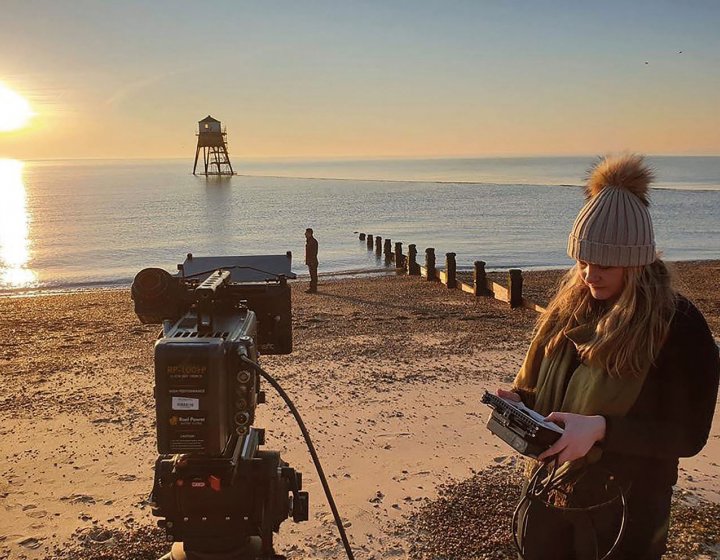
Television & Film Production BA(Hons)
Discover how to create everything from high-end dramas with full scale crews through to fast moving ...
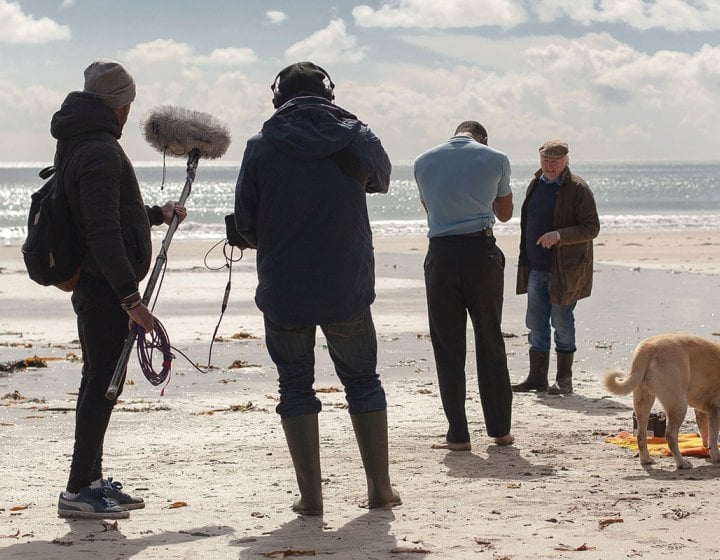
Film BA(Hons)
Develop your filmmaking abilities, honing your practice and deepening your understanding of cinema. ...
Open Days and events
From visiting campus to online application advice, get all the information you need about joining our creative community.
Find an event


